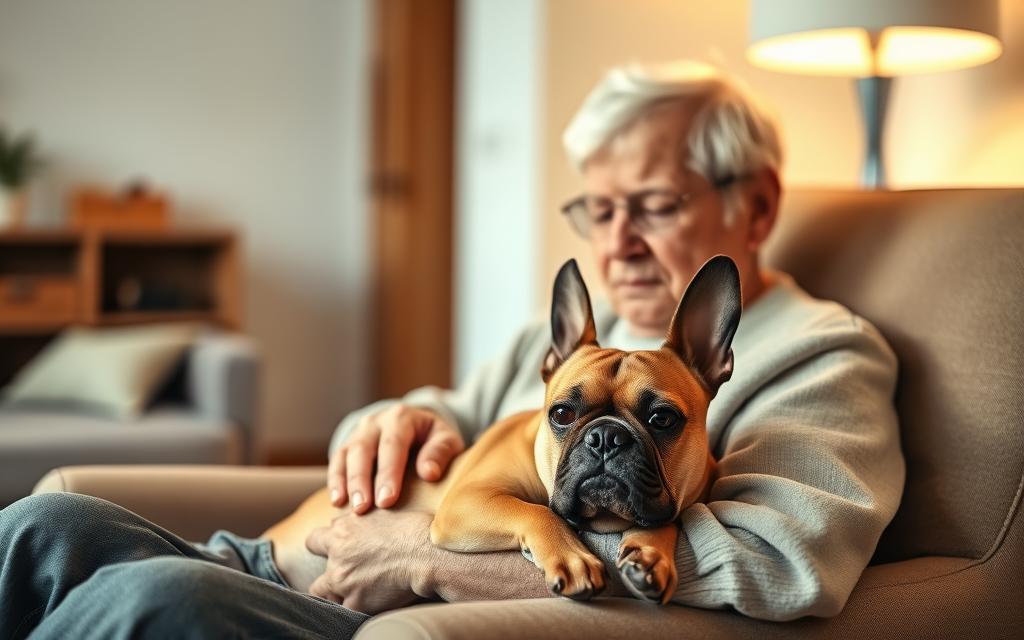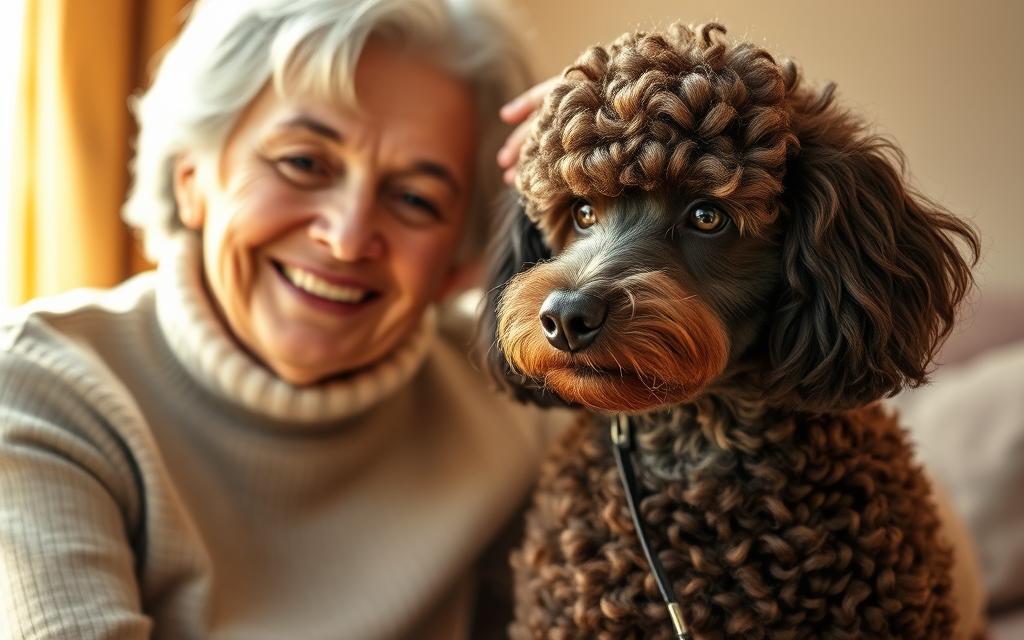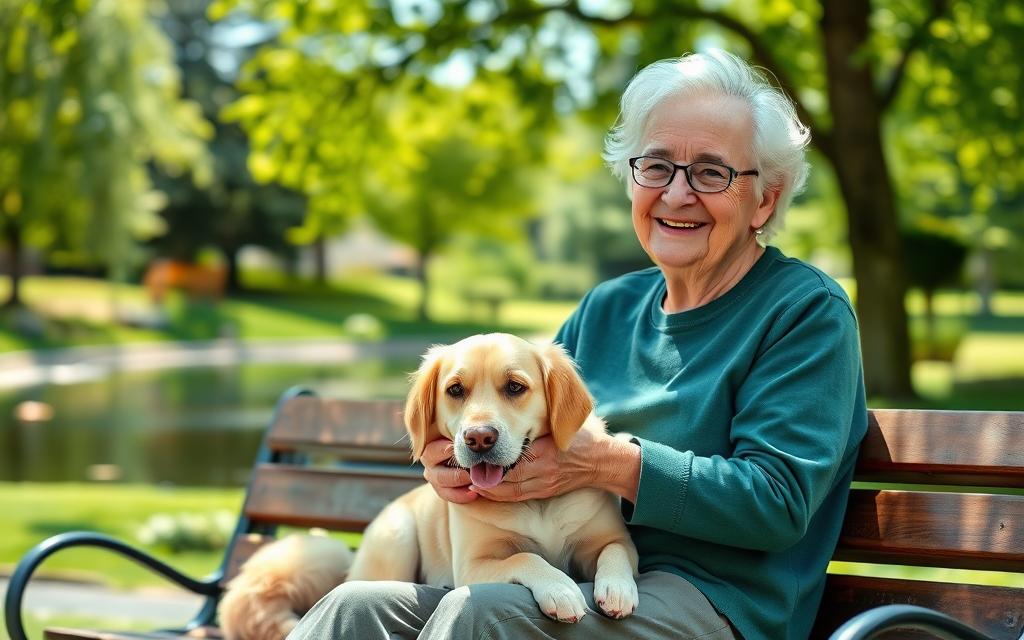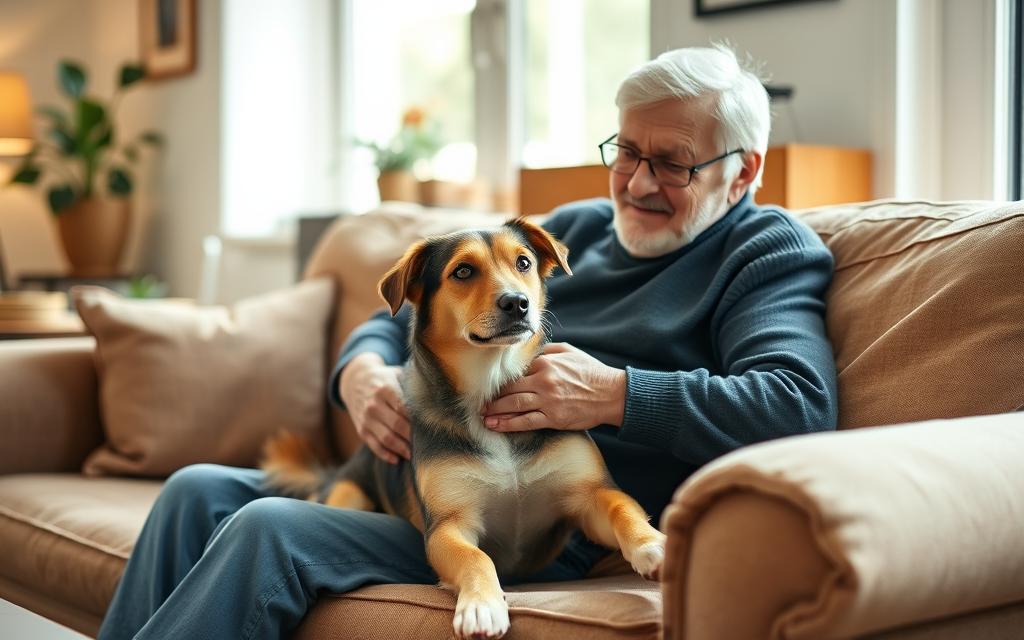Companion Dogs for Seniors: Best Dog Breeds Guide
As you get older, having a furry companion can bring comfort and joy. Companion Dogs for Seniors offer friendship, emotional support, and can even help you stay active. But what makes a dog breed good for older adults?
Studies show that having a dog can help seniors feel less stressed and happier. With so many breeds out there, picking the right one can be hard. Are you curious about which dog breeds are the best friends as you age?
Having a dog can help you stay active, and some breeds are better for seniors than others. You’ll see that Companion Dogs for Seniors can add a lot of happiness and friendship to your life.
Key Takeaways
- Dog ownership can reduce stress and improve mental well-being for seniors.
- Certain dog breeds are more suitable for older adults than others.
- Companion dogs can encourage physical activity and social interaction.
- The right breed can bring immense joy and companionship into your life.
- Companion Dogs for Seniors can be a valuable companion.
The Joy of Canine Companionship in Your Golden Years
Dogs make seniors’ lives brighter with their friendship and joy. As people get older, they might feel lonely or have trouble moving. But, having a dog can really help, making their days more meaningful.
How Dogs Transform Senior Living Experiences
Having a dog can change seniors’ lives for the better. It makes them want to move more and stay active. Whether it’s a walk or playtime, dogs need to exercise, helping seniors stay healthy.
Also, taking care of a dog gives seniors a routine. This is good for their minds. Dogs also help seniors feel less lonely, giving them love and a friend.
Physical and Mental Health Benefits of Dog Ownership
Studies show dogs are good for seniors’ health. Caring for a dog can lower heart disease risk and improve movement. It also helps with stress and anxiety, making seniors feel better.
The bond between a senior and their dog is also good for their brain. It can even slow down memory loss. This is because caring for a dog keeps their mind active.
Why Companion Dogs for Seniors Make a Difference
Many seniors find joy in having a dog. Dogs help fight loneliness and isolation. They offer love, friendship, and a feeling of connection.
Combating Loneliness and Creating Meaningful Connections
Dogs are more than friends to seniors. They give love and emotional support. Being with dogs can make seniors feel less alone.
Dogs help seniors meet new people. They can start conversations at the park or join dog groups. This helps seniors make friends and feel connected.
Establishing Daily Routine and Purpose
Dogs give seniors a reason to get up in the morning. They need to be fed, walked, and groomed. This routine helps seniors feel needed and important.
Playing with dogs keeps seniors active. It helps them stay healthy and happy. This makes their lives better and more fulfilling.
Security and Peace of Mind Benefits
Dogs make seniors feel safer. They can scare off intruders and alert them to danger. Dogs also help reduce stress and anxiety.
For seniors living alone, a dog is a big comfort. It makes them feel safe and loved. Knowing they have a loyal friend at home is very reassuring.
Key Factors to Consider When Choosing a Senior-Friendly Dog Breed
Choosing a dog breed for seniors needs careful thought. Think about what fits your lifestyle and needs. This is key to finding the right dog for you.
Energy Level and Exercise Requirements
Consider the dog’s energy level and how much exercise it needs. Some dogs need a lot of activity. This might not be good for seniors who have trouble moving.
Size, Weight, and Strength Considerations
Think about the dog’s size, weight, and strength. Big dogs can be hard to handle, which is tough for seniors living alone. Smaller or medium-sized dogs might be better.
Grooming Needs and Maintenance Challenges
Grooming is very important. Some dogs need a lot of grooming, which can be hard for seniors. Look for breeds with easy-to-maintain coats.
Temperament and Trainability Factors
A dog’s temperament and how easy it is to train are very important. A calm and easy-to-train dog is best for seniors. You want a dog that listens well and isn’t too demanding.
| Breed | Energy Level | Grooming Needs | Temperament |
|---|---|---|---|
| Cavalier King Charles Spaniel | Moderate | Moderate | Gentle, affectionate |
| Bichon Frise | Low-Moderate | High | Playful, friendly |
| French Bulldog | Low | Low-Moderate | Calm, adaptable |
By thinking about these things and looking at different breeds, you can find a great dog for seniors. This dog will be your perfect companion.
Cavalier King Charles Spaniel: The Affectionate Lap Dog Companion
If you’re a senior looking for a dog, think about the Cavalier King Charles Spaniel. They are loving and easy to get along with. This makes them perfect for older adults.
Gentle Temperament and Loving Personality Traits
The Cavalier King Charles Spaniel is known for being gentle and loving. They love to be around people and are often called “lap dogs”.
These dogs are friendly and get along well with others. They make great pets for many families. They can also bring comfort and company to seniors.

Moderate Exercise Needs and Daily Walks
Cavalier King Charles Spaniels need regular exercise to stay healthy. They enjoy daily walks and playtime. But, they don’t need too much, which is good for seniors.
A 30-minute walk a day is enough. They also like to run around in a safe area. This makes them a good choice for many seniors.
Grooming Requirements and Health Considerations
Cavalier King Charles Spaniels need some grooming. Their coats need brushing to avoid mats. They also need baths sometimes and ear checks to avoid infections.
They can get sick, like heart problems or obesity. So, it’s important to take them to the vet often. Also, feed them a healthy diet to keep them well.
Bichon Frise: The Cheerful, Hypoallergenic Friend
The Bichon Frise is a great pet for older adults. It’s playful and loving. This makes it perfect for seniors who want a friend.
Playful Temperament and Affectionate Nature
Bichon Frises are very cheerful and loving. They love being around people. They make great friends.
They are playful but gentle. This is good for seniors who are not as active. They will keep you company and happy.
Low-Shedding Benefits for Senior Living
The Bichon Frise has a special coat. It sheds very little. This is great for seniors with allergies.
They need regular grooming. But it’s worth it for their health. It’s also a chance to bond with your pet.
Exercise Requirements and Social Needs
Bichon Frises need to move to stay healthy. They need walks and play. You don’t need a big yard.
They also need to meet new people and animals. This helps them grow up well. It’s a good way for seniors to meet others.
Getting a Bichon Frise is like getting a friend. They help you stay active and social. They fit your lifestyle perfectly.
French Bulldog: The Low-Maintenance Apartment Companion
If you’re a senior looking for a low-maintenance dog, the French Bulldog is a great pick. This breed is calm and adapts well to living in apartments.

Calm Demeanor and Loyal Companionship Qualities
The French Bulldog is known for being calm and loyal. They love their owners and are very affectionate. This makes them perfect for seniors who want a loving pet but don’t need a lot of work.
Minimal Exercise Needs for Less Active Seniors
French Bulldogs need very little exercise. They’re happy with short walks and don’t get tired easily. This is great for seniors who might not be as active.
Health Considerations and Care Requirements
French Bulldogs are usually healthy but need some special care. They can have breathing problems in hot weather. They also need to watch their weight to stay healthy. Regular vet visits and a good diet are key to keeping them well.
Getting a French Bulldog means you’ll have a loyal friend. They will bring joy and comfort into your life.
Greyhound: The Surprising Couch Potato
Greyhounds are called “couch potatoes” because they love to relax. They are perfect for seniors who want a low-maintenance pet. They are happy to spend their days lounging around the house.
Relaxed Indoor Personality
The Greyhound is a gentle giant. They are calm and perfect for indoor living. They are not high-strung or demanding, making them great for seniors who want a peaceful pet.
Exercise Patterns and Walking Routines
Greyhounds are fast but don’t need a lot of exercise. A short walk or a chance to run in a fenced area a few times a week is enough. This is good for seniors who can’t keep up with high-energy dogs.
| Exercise Needs | Frequency | Duration |
|---|---|---|
| Walks | 2-3 times a week | 15-30 minutes |
| Running | 1-2 times a week | 10-20 minutes |
Adoption Benefits and Retired Racers
Many Greyhounds are available for adoption after racing. Adopting a retired racer is rewarding. It gives a loving home to a dog that deserves a second chance. Organizations help match you with the perfect companion.
Adopting a Greyhound supports a noble cause. These dogs are affectionate and will become a beloved family member.
Poodle: The Versatile and Intelligent Companion
Thinking about a smart and easy-to-get-along-with dog? The Poodle is a great pick for seniors. They are very smart, can fit into many homes, and don’t shed much. This makes them perfect friends for older folks.

Size Options for Various Living Situations
Poodles come in three sizes: Toy, Miniature, and Standard. This means there’s a Poodle for every home size. If you live in a small place, a Toy Poodle is great. But if you have lots of room, a Standard Poodle is perfect.
Mental Stimulation and Trainability
Poodles are very smart and need fun things to do. Playing with them, solving puzzles, and learning tricks keeps their minds sharp. They are easy to teach, which helps you bond and feel proud of your dog.
Benefits of a Hypoallergenic Coat
Poodles have a special coat that doesn’t shed much. This is great for seniors with allergies or who don’t like dog hair. But, they do need regular grooming to stay looking good.
In short, Poodles are smart, adaptable, and don’t shed much. They are a wonderful choice for seniors looking for a loyal and fun friend.
Preparing Your Home and Lifestyle for a Canine Companion
Before you bring home your new furry friend, it’s important to prepare. This makes the transition smoother for you and your dog. It also ensures a happy and healthy relationship.
Creating a Senior-Friendly Environment for Your Dog
To make your home safe and welcoming for your dog, you need to dog-proof it. This means keeping toxic substances, electrical cords, and fragile items out of reach. You should also think about your home’s layout to make it easier for you and your dog to move around.
Key areas to focus on include: – Securing your trash and recycling bins – Blocking off areas you don’t want your dog to access – Setting up a comfortable and quiet space for your dog to rest
Finding Support Systems for Pet Care Assistance
Having a support system is key for dog care. This could be family, friends, or professional pet care services. Knowing who to turn to ahead of time helps manage your dog’s needs when you’re not around.
Consider the following options: – Local dog walking or pet sitting services – Veterinary clinics with emergency care – Support groups for senior dog owners
Financial Planning for Veterinary Care and Maintenance
Having a dog means you’ll spend money on vet care, food, and supplies. It’s important to budget for these costs. This way, you can take care of your dog without worrying about money.
| Expense Category | Estimated Monthly Cost | Annual Cost |
|---|---|---|
| Veterinary Care | $50-$100 | $600-$1200 |
| Food and Supplies | $30-$70 | $360-$840 |
| Total | $80-$170 | $960-$2040 |
Exploring Service and Therapy Dog Options
If you want a dog that does more than just keep you company, think about service or therapy dogs. These dogs are trained to help people with specific needs or to bring comfort.
Service dogs help people with disabilities. Therapy dogs provide affection and comfort. Knowing the difference and what training is needed can help you decide if this is right for you and your dog.
Conclusion: Embracing the Rewards of Senior Dog Ownership
Owning a dog can change your life. It brings many rewards, like companionship and emotional support. A dog can fight loneliness and give you a sense of purpose.
Choosing the right dog can make your golden years better. Dogs like Cavalier King Charles Spaniels and French Bulldogs are great friends. They offer love, comfort, and security.
Embracing dog ownership means a more fulfilling life. With the right support, you’ll enjoy the love and support a dog gives.
Resources:
Pets for the Elderly Foundation
Best Dogs for Seniors: 5 Best Dog Breeds for Seniors Golden Years
Best Small Companion Dogs for Seniors
Best Dog for Seniors Over 70 Guide
FAQ
Q: What are the benefits of having a companion dog as a senior?
A: A dog can be a great friend for seniors. They offer companionship and emotional support. Dogs also help with physical and mental health.



